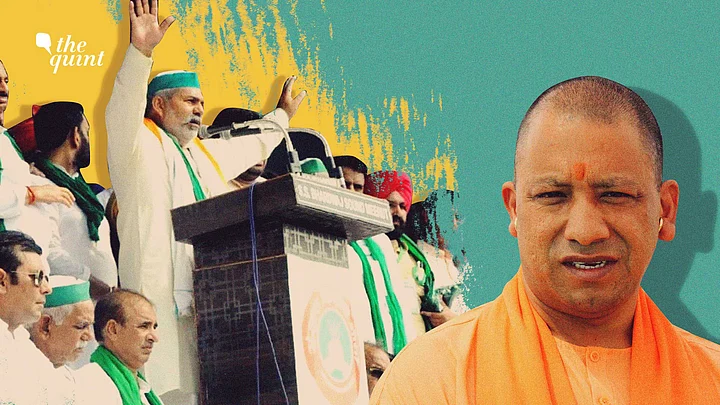At a massive Kisan Mahapanchayat in Uttar Pradesh's Muzaffarnagar, the farm unions protesting against the Union government's farm laws announced that they would campaign to defeat the BJP in the upcoming Assembly elections in Uttar Pradesh.
Reacting to the Mahapanchayat, the BJP called it an "election meeting" and alleged that it was driven by political motives. The BJP is also likely to launch an outreach campaign with farmers to counter the impact of the farmers' protest.
Now, can the farm unions damage the BJP and chief minister Yogi Adityanath in the UP elections? Or will the BJP be able to contain its impact?
There are three dimensions to the tussle between the farm unions and the BJP in the context of the UP elections.
A Clash of Narratives
At the Mahapanchayat, Bharatiya Kisan Union leader Rakesh Tikait chanted "Allahu-Akbar", "Har Har Mahadev" and "Jo Bole So Nihal". These slogans are important and are a throwback to the era of legendary farm union leader Mahendra Singh Tikait.
His rallies always featured the slogans of both Hindus and Muslims as an effort to establish communal harmony and shared agrarian interests between farmers of the two communities.
However, Tikait's clip from the Mahapanchayat was edited to show only the "Allahu-Akbar" part and circulated on social media by right wing supporters. The idea was to somehow present the farmers' protest as a Muslim conspiracy.
This in many ways symbolises that battle of narratives between the BJP and the protesting farmers.
In the run-up to the UP elections, the main tussle between the two sides would be on who gets to shape the narrative.
The BJP's poll pitch is likely to be focussed around the following keywords: "Hindutva", "Ram Mandir", "love jihad" and "law and order".
Though the party will emphasise on "development", the underlying message is to present Adityanath as a leader who has promoted Hindutva, "put Muslims in their place" and acted "tough" on law and order.
The farm unions, on the other hand, want to prevent the BJP from making this election a communal one. Instead, they want the focus to remain on farmers' issues.
For the Tikaits and the Rashtriya Lok Dal, the revival of agrarian politics is important both in itself and as a counter to the communal polarisation in western UP.
But the manner in which his chanting 'Allahu-Akbar' was taken out of context, is an important reminder for Tikait that the political landscape of West UP isn't what it was during his father Mahendra Singh Tikait's time.
The communal polarisation that Mahendra Singh Tikait had resisted increased manifold after his death and Rakesh Tikait and Naresh Tikait abetted this process.
Therefore, the battle to keep the election narrative around farmers' issues won't be an easy one for the farm unions.
Winning Over BJP'S Vote Bank
The communal polarisation that took place in the run-up and aftermath of the 2013 Muzaffarnagar violence led to a massive consolidation of Jat votes behind the BJP, harming the agrarian politics of Tikaits and RLD.
In the 2019 Lok Sabha elections, the Jat consolidation behind BJP was close to 90 percent, according to the CSDS survey.
This vote bank would be the main bone of contention between the BJP and the unions.
The main test for the unions would be to what extent they can wean Jats away from the BJP. The RLD will be the main rival of the BJP in this space and it is likely to contest in alliance with the Samajwadi Party.
As things stand today, the RLD does seem to be gaining some ground among Jat farmers at the BJP's expense. It remains to be seen whether the party is able to sustain this momentum.
There's another issue here. While the RLD-SP alliance may still be able to consolidate some Jat votes, it's doubtful whether the farm unions will be able to convince other farming communities like Gujjars and Tyagis to move away from the BJP.
Expanding Beyond West UP
The farm unions may be seeking to defeat the BJP in UP but their geographical limitations need to be kept in mind. As things stand today, the farm unions' mobilisation in UP is largely concentrated in West UP and the Terai region, which includes parts of both UP and adjoining districts of Uttarakhand.
There doesn't seem to be a similar kind of mobilisation in regions like Bundelkhand, Awadh and East UP. This is largely because the farmers here haven't been unionised to the same extent as say the sugarcane farmers of West UP.
This is a major limitation to the possible impact of the farm unions in the UP election. There's also the danger that if the unions, especially leaders like Tikait, try to influence things in UP's central and eastern districts, they may lose focus from their core territory.
Therefore, the farm unions may have to be tactical in the upcoming polls and focus their energies on their core territories like Punjab, West UP and the Terai districts of UP and Uttarakhand.
Their second, and probably larger challenge in UP, would be to try and keep the narrative around agrarian and economic issues and prevent communal rhetoric from hijacking the discourse.
